G8 Summit in Gleneagles 2005
The 31 G8 summit was held from July 6 to 8. July 2005 in Gleneagles Hotel in Auchterarder , Perth and Kinross , in Scotland instead. The host was British Prime Minister Tony Blair . The summit was overshadowed by the attacks on the London Underground on July 7, 2005, the second day of the conference.
Attendees
All heads of government of the G8 member states as well as other invited representatives of the European Union
Invited representatives (partial participation)
subjects
Traditionally, the host of the G8 summit sets the negotiating agenda. This usually takes place at ministerial level in the weeks leading up to the summit. In the end, this leads to the creation of a joint final declaration which can be signed by the participating states . For 2005, the British host focused on the issues of global climate change and the lag in economic development in Africa . Other topics included the fight against international terrorism , the non-proliferation of nuclear weapons and reforms in the Middle East .
Africa and Middle East
With regard to the central topic of development in Africa , the aim was to agree on the most extensive debt relief possible and additional aid for Africa. The British Prime Minister Blair had spoken out in advance for an extensive aid program for the developing world . The heads of state and government of the G8 countries agreed on additional development aid of 50 billion dollars a year until 2010. At the same time, aid such as the previously agreed debt relief of 40 billion dollars for the 18 poorest nations was confirmed. In addition, the G8 states emphasized that they wanted to guarantee fairer world trade. In return, the recipient nations agreed to promote democratic development in their countries.
An aid package of up to three billion dollars for the Palestinian Territories was also discussed . The G8 nations confirmed the payments for the coming years to further the peace process in the Middle East .
Climate change
With regard to the central topic of climate change , the aim was, on the one hand, to do more research internationally on the consequences of global warming . Tony Blair also wanted to agree on measures that went far beyond the Kyoto Protocol by trying to convince key developing countries that have not yet joined the Protocol to reduce their greenhouse gases by promising to transfer environmental technology.
US President Bush reiterated his rejection of the Kyoto Protocol to reduce greenhouse gases , while the other heads of state and government of the signatory states Germany, Great Britain, Russia, Japan, France, Canada and Italy accepted the protocol and its goal of reducing greenhouse gas emissions up To reduce 2012 to the value of 1990, advocated. The heads of government from India , the People's Republic of China , Mexico , Brazil and South Africa were also invited to this summit theme . The G8 countries have declared their readiness to support these nations in their transition to renewable energies and modern technology in the future, also through cheap loans from the World Bank .
The subject will be continued in the Gleneagles Dialogue .
terrorism
However, due to the terrorist attack of July 7th, the summit's attention was drawn to the fight against terrorism , leaving other important issues unresolved.
British Prime Minister Blair left the summit at short notice to attend a meeting of the British Security Cabinet in London. During his absence he was represented by British Foreign Secretary Jack Straw . The heads of state and government of the G8 states reaffirm their determination to continue the summit as planned and not to give in to terrorism.
Protests
The summit was accompanied by demonstrations of so-called globalization critics .
Web links
- G8 Gleneagles 2005 Official Website
Individual evidence
- ↑ Delegations to the G8 Summit in Gleneagles 2005 (University of Toronto)
- ↑ Can Africa still be helped? faz.net, July 4, 2005, accessed September 3, 2015 .
- ↑ "Not The End of Poverty in Africa". faz.net, July 8, 2005, accessed September 3, 2015 .
- ↑ A new action plan aims to curb global warming. faz.net, July 7, 2005, accessed September 3, 2015 .
- ↑ G8 defies bombers as summit continues. theguardian.com, July 7, 2005, accessed September 3, 2015 .
- ↑ Video snippet on channel B

